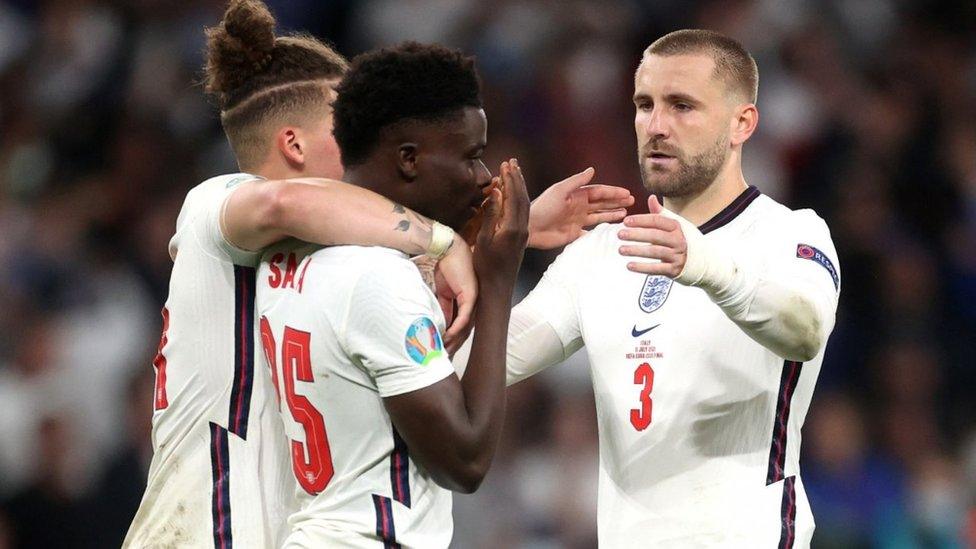Football abuse: Rise in reported cases
- Published
- comments

England's Bukayo Saka was racially abused online after he missed a penalty in the Euro 2020 final
Anti-discrimination charity Kick It Out says there has been a 65% rise in reports of abusive behaviour in the UK in the past year.
The organisation said it had received 1,007 reports in total, which includes both people playing on amateur and professional teams, as well as incidents on social media.
Just under half of the reports (43%) at a non-professional level were made by players aged under 18.
Who was involved?
Of the 105 cases reported by young people, the majority of those - 98 - were reported by boys, while only seven reports involved young female players.
In the older age groups, there were more reported cases of players being behind the abuse than in the younger teams, aged under 13.
Stats showing the breakdown of cases involving teams aged under 18
What was the most commonly reported type of abuse?
Overall the report found a 65.1% rise in reported incidents of discrimination during the 2022-23 football season compared to the previous season.
Racism remains the most commonly reported form of discrimination, accounting for nearly half of all reports at both grassroots and professional level, as well as on social media.
Grassroots means all football that is non-professional and non-elite, for example children, schools and youth football, and amateur football.
Reports of online abuse had increased from 74 to 281 - a rise of 279%, while reports of sexist behaviour were shown to have risen from 16 to 80 - up by 400%.
Players over the age of 13 were more likely to be behind the abusive behaviour in reported cases, the study found
The significant increase in reports across the game is alarming - and it strengthens our resolve to tackle discrimination in all areas of football.
Does a rise in reporting mean a rise in abuse?
But Kick It Out said the big increases might not automatically show there has been an increase in abuse, but could also show an increase in awareness of the problems, and a greater willingness by those who experience or witness discrimination to speak out about it.
The charity's chief executive Tony Burnett said: "Behind each of these statistics is somebody who has sadly experienced discrimination, and supporting the victims of abuse remains Kick It Out's utmost priority."
Marcus Rashford was one of several players in the England team who was racially abused after missing a penalty in the Euros
After the Euro 2020 final England players Marcus Rashford, Bukayo Saka and Jadon Sancho received online racist abuse for missing their penalties in the penalty shootout defeat by Italy.
Fifa reported that almost 20,000 abusive social media posts were aimed at players, coaches and officials during last year's World Cup - with more than 20 million posts being scanned by moderation software and hidden from public view due to their offensive content.
The biggest increase in abuse came after England's quarter-final loss to France, when Harry Kane missed a late penalty.
Which other sports are affected?
Discrimination and abuse isn't only a problem for football.
In cricket, racism, sexism, classism and elitism were "widespread" in the English and Welsh game, according to a report published in June by the Independent Commission for Equity in Cricket (ICEC).
And earlier this year, a Rugby Football Union investigation found the former England international Luther Burrell's claims of racism in the sport were true.
- Published6 September 2021
- Published1 April 2022
- Published12 March 2020
- Published3 November 2019
